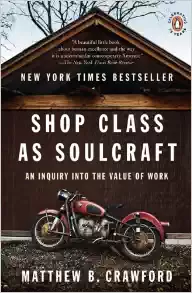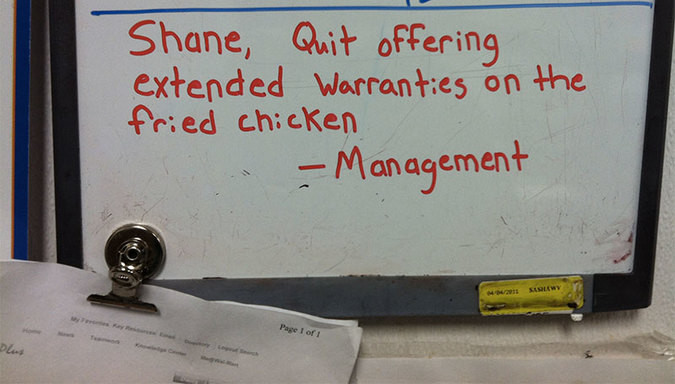Software with soul
A review of Shop Class as Soulcraft by Matthew B. Crawford

It’s great to be a knowledge worker nerd in 2016. I mean that seriously — programmers continue to nurture the world’s greatest public library of information, programmer-mathematicians are modeling physical systems with ever-better realism, scientists are on the verge (since forever) of creating the first actually useful quantum computer, and Elon Musk is really going to send people to Mars in 2025.
And manual labour isn’t the only way to get stuff done anymore. Which means I don’t have to carry water to have a shower. I love not having to do that.
I love that coding is trendy nowadays — although there are downsides to having GitHub filled with every amateur’s half-finished prototype, on balance I think it’s more the kind of good that happens when craft beer gets crazy popular and you can find a rich dark ale without having to hunt down a quaint English pub far away in… England.
So when a philosopher/carpenter cousin of mine handed me a book pitched as “a philosopher/mechanic’s wise (and sometimes funny) look at the challenges and pleasures of working with one’s hands”, it struck enough cognitive dissonance in me to catch my nerdy interest.
Shop Class as Soulcraft by Matthew B. Crawford is a succinct critique of the modern knowledge economy, from someone who knows both sides of the fence pretty well. What caught my eye first was the surface similarity to a long-time favourite of mine, Zen and the Art of Motorcycle Maintenance (ZMM), which helped form some of my earliest articulate beliefs in the value of work done with care. “Shop Class“ is also written by a motorcycle mechanic, has a beautiful vintage motorbike pic on the front cover, and it turns out that Matthew Crawford is also a bit of a ZMM fan, quotes ZMM regularly, and discusses similar themes.
So I figured “Shop Class” would just be another one of those cheap knockoffs. And after skimming the first couple pages, I got suspicious that the book would be an overly-romanticised portrayal of the good old days, authenticity that’s so authentic you could vomit, and words like “craft“ and “artisan”, without really acknowledging either the dull reality of manual labour or the real rewards of intellectual labour.
It’s not. The book stands squarely on its own ground. It meshes well with ZMM, but where ZMM mainly philosophises (quite well) about “quality” and a view of the world that embraces both gestalt intuition and analytic reason, “Shop Class” lays out the concrete advantages of a specific way of life centered on manual work, and critiques knowledge work head-on.
It’s an engaging read, and worthwhile mindfood for the thoughtful programmer.
The book at a glance

Matthew Crawford’s basic premise is that, ever since “scientific management” and knowledge work became a thing, over the past 50-100 years, cerebral work has been put on a cultural pedestal, and manual labour has become an untouchable. His observation that shop class (“manual” here in New Zealand) has been elided from the American school curriculum is representative of this.
But, says Crawford, knowledge work isn’t all it’s cracked up to be, and is demoralising. It’s just so disconnected from the real ends that it achieves — you can dedicate a life career to, say, incentivising employee performance, barely ever meeting one of the folks who use the hedge trimmers that your company manufactures.
“Once the cognitive aspects of the job are located in a separate management class, or better yet in a process that, once designed, requires no ongoing judgment or deliberation, skilled workers can be replaced with unskilled workers at a lower rate of pay. … In the last thirty years American businesses have shifted their focus from the production of goods (now done elsewhere) to the projection of brands … Process becomes more important than product.”
This steers how we advise kids on their career choices (“You can do better than joinery. Get a science degree.”), and ultimately results in the degradation of both manual labour (it’s not good enough) and intellectual pursuit (skillful folks end up doing data entry under the name “business intelligence analyst”).
Crawford also bites hard at the tendency to absurdly and deceptively inflate job descriptions to make them seem less mundane. Modern teenagers don’t flip burgers, they are
“mavericks operating at the bohemian fringe … at the very heart of process innovation … in science and engineering, architecture and design[unleashing their people power] as they have fun while being the best. [A] small change made on the salesroom floor — by a teenage sales rep … acting on a thought to increase outreach. [O]ur economic success increasingly turns on harnessing the creative talents of each and every human being.
Frank Levy, the MIT economist, responds to this by dryly noting that ‘where I live Best Buy seems to be starting people at about $8.00 an hour’.”
Crawford glows about the pleasures and benefits of manual work. The pride a builder takes in seeing his construction being used for its purpose in society, or the joy your electrician sparks when the lights go on. Touching more deeply, he notes the richness of being master of one’s own stuff (think the guy whose car company refuses to fix the engine, so, after a trip to the library for the car’s manual, starts messing around with it himself), and observes that manual interaction with the physical world is actually vital for clear thinking and philosophy about the real world.
“… in the practice of surgery, ‘dichotomies such as concrete versus abstract and technique versus reflection break down in practice. The surgeon’s judgment is simultaneously technical and deliberative, and that mix is the source of its power.’ The same could be said of any manual skill that is diagnostic, including motorcyle repair. You come up with an imagined train of causes for manifest symptoms and judge their likelihood before tearing anything down. This imagining relies on a stock mental library, … the functional kinds of an internal combustion engine, their various interpretations by different manufacturers, and their proclivities for failure.”
(Actually, that sounds a lot like debugging software.)
I like best that Crawford stands against the idea that 21st-century humans are smarter than ever before, and humanity is on the cusp of unlocking a complete internet-fueled brainpower revolution. He stresses that intellectual pursuit is hard, that creativity and smartness are the product of strenuous engagement with real-world constraints.
“The truth, of course, is that creativity is a by-product of mastery of the sort that is cultivated through long practice. It seems to be built up through submission (think a musician practicing scales, or Einstein learning tensor algebra). Identifying creativity with freedom harmonizes quite well with the culture of the new capitalism, in which the imperative of flexibility precludes dwelling in any task long enough to develop real competence.”
It’s not that modern tech is a bad thing, per se:
“Riding an early motorcyle entailed a certain preparation. … Set the choke … for the ambient temperature … Then approach the kick-starter with due apprehension, bracing yourself for yet another blow to your chronically bruised shin. Like a mule, [an early motorcycle] was emphatically not simply an extension of one’s will. Old bikes don’t flatter you, they educate you.”
It’s just that we’ve turned technology into a way to hide from, rather than engage with, reality. Technology exists for us, not the other way round, and the relative convenience of modern machines is great. But while we see it as freedom and control, it can also be a kind of imprisonment: we’re at the mercy of whoever designed the cheap plastic junk with magic smoke inside.
Where he’s heading with all this is that right from our school days, we’re pushed to view knowledge work as the desirable human endeavour, and manual labour as a fungible commodity, bothersome work that we receive “fair compensation” for — it doesn’t matter who (or what) stitches the shoes, or where. Our noble work as managers is to figure out how to make it all happen efficiently, but this disconnects us from what we produce and leaves us with little pride or sense of accomplishment in our work.
Worse, there is no direct accountability: if your toilet leaks after the plumber’s been through, you know who to call, and they’ll fix it for you, embarrassed they slipped up. But if worker efficiency drops, it’s much harder to point to the manager who implemented Party Fridays. Corporate language becomes empty, abstract, and morally ambiguous, like something from Orwell. And “teamwork” becomes more important than measurably good work.
Unlike manual work, the sausages that come out of the corporate machine are ambiguously defined, and their success or failure tends to be indirect. Being a team player becomes vital. Not treading on people’s toes is important. “Sensitivity training becomes necessary.” And the thing you’ll be measured on is your personality, your credentials, your prestige.
Not to mention your ability to use language to take others’ credit and hide direct blame. To quote a goodie:
“[O]ne of the principles of contemporary management is to ‘push details down and pull credit up.‘ That is, avoid making decisions [and] spin cover stories after the fact that interpret positive outcomes to your credit. … If things go well: ‘Finding cross-marketing synergies in the telecommunications and consumer electronics divisions has improved our strategic outlook heading into the fourth quarter.’ If things go badly: ‘Change the Vonage display? That was the kid’s idea. What’s his name, Bapu or something? Geez, these immigrants.’”
That’s terrible by anyone’s definition. So what’s the plan? Crawford sums it up pretty well in general terms:
“To live wakefully is to live in full awareness of this, our human situation. … Too often, the defenders of free markets forget that what we really want is free men. Conservatives are right to extol [private property] as a pillar of liberty, but when they put such arguments in the service of [corporate property], they become apologists for the ever-greater concentration of capital. The result is that opportunities for self-employment and self-reliance are preempted by distant forces.
[It] seems best to conclude by registering a note of sobriety. [Despair or a fantasy of futuristic revolution] distract from the smaller but harder work of living well in this life. The alternative to revolution … is resolutely this-worldly. … In practice, this means seeking out the cracks where individual agency and the love of knowledge can be realized today, in one’s own life.”
Despair, revolution, and this-worldliness for nerds

At first glance, this isn’t what a professional programmer wants to hear. Why am I bothering?
Firstly, the book is a healthy critique of much that’s wrong with the professional world of software development, and if programmers don’t engage with it, then we’ll just stay in our echo chamber.
There’s a lot that I can identify with in the Crawford’s dim view of corporate culture, and nerds aren’t exempt. And while I don’t actually think, like some world-weary programmers, that programming sucks, there are a couple dark sides to the work that can suck your soul.
We programmers dream in abstractions, and it’s a daily challenge to keep both feet on the ground. Programmers get drawn to rockstar abstractions, perhaps because the alternative — like a movie star hanging out laundry — just seems too mundane. An AI system to cluster documents when a simple text search would do. A peer-to-peer network architecture when all you need is a pipe. XSLT. Enough said.
It’s also sometimes difficult just to get things done in software, because there are so many generic methodologies and processologies — manual labour doesn’t have a monopoly on mundane tasks. 100-page specs, all detail and no clarity, or 300-page ISO standards that say next to nothing — those guys haven’t read their William Zinsser. These processes rarely catch the kinds of things that can make or break a feature, the things that come out when a real human sits behind the first half-working prototype.
Programmers also get easily hooked on a given method(ology) as the one true way. If we’ve been burnt in the past by forgetting whether a variable was milliseconds or seconds or average donuts per american male, we start prefixing every variable name with ms_ or donuts_ or taintedB64String_. This kind of code tic quickly balloons and makes for incomprehensible code. “Does this 20-line if statement actually do anything, or is it all because some coder had a rule that every function call had to be wrapped in a failure-catching block?”
These crazy things are normal because software quality is so hard to measure. If you’re after a completely objective measuring-stick, “it works” is about as objective as it gets for software, and even that’s often ambiguous. But what works today may break tomorrow, because a developer failed to communicate her intent clearly. Functional correctness is not a very good measure of what matters — with software, perhaps more so than anything else besides the creative arts, the real quality judgment is in the feel of the thing, the aesthetic value of what lies beneath, the intentions of the author.
Meaning and comprehensibility are all-important factors in software development, unlike, say, plumbing, and for good reason: software has a presence far beyond its immediate function. It is honed and maintained by humans, and if humans don’t get or like it, then it dies.
So Crawford’s criticism comes full circle: a machine that you don’t understand, owns you, not the other way around, and this is why the true measure for the quality of software is not simply whether it works, but how lucidly it sings.
Secondly, what I found coolest about Crawford’s vivid account of his work repairing motorcycles for their enthusiast owners, was not the contrast to knowledge work, but the number of striking similarities to the average day in the life of a programmer.
Crawford spends a bit of time on the cognitive value of manual work. Someone who works with their hands engages the physical world in ways that theoretical scientists only theorise about. This means they grow to truly understand its behaviours and quirks, and this enables them to reason about the world and solve problems and create theories that mesh well with the physical world.
“Many inventions capture a reflective moment in which some worker has made explicit the assumptions that are implicit in his skill. … The steam engine is a good example. It was developed by mechanics who observed the relations between volume, pressure, and temperature … at a time when theoretical scientists were tied to the caloric theory of heat, [which turned out to be a dead end].“
He also discusses the unique character of repair work:
“There is always a risk of introducing new complications when working on decrepit machines, and this enters the diagnostic logic. Measured in likelihood of screwups, the cost is not identical for all avenues of inquiry when deciding which hypothesis to pursue — for example, when trying to figure out why a bike won’t start. … Do you really want to check the condition of the starter clutch, if each of the eight screws will need to be drilled out?”
He’s debugging the bike. Fixing bugs is not the most fun part of programming, to be sure, but it’s the most character-building. The part where you learn not to make wild assumptions. The part where you grow up and start taking responsibility for your mistakes and being careful not to break something that somebody else thought hard about.
Programmers make machines do stuff. We carefully fit pieces of machinery together (never mind for now that the pieces are often abstractions), constrained by rules as unbending as the laws of physics that constrain a mechanic filing a valve to fit a valve chamber. We make judgement calls about the health of a system by listening to the funny noises it makes when the fluid drips from the leaks. We dismantle these pieces of machinery until we find what piece is skewing the timing. Or we find that the problem was in a different place of the system entirely, and, huffing, we piece it all back together again.
We make parts for the machine that cause other parts to move, shuffle, turn, which in turn causes yet more parts to tumble, vibrate, fire, so that ultimately the machine fills its born purpose, if we do our job well.
I’m not trying to be down on abstractions. The cool thing is that abstractions are part of this machinery. They’re part of what makes a coder’s job different from other engineering. Without abstractions, computers would be more-or-less useless in the modern world. The difficulty is getting them right.
As programmers, we can’t assume just because abstractions are vital to our craft, that we must use them whenever possible. The opposite is true. Abstractions are like advice from a friend: in measured doses, life-giving, but in large quantities or at the wrong time, just hot air.
Open Source: possess by understanding
 Richard Stallman, Open Source prophet guy
Richard Stallman, Open Source prophet guy
One of Crawford’s complaints is how you can’t just open up the hood of a car nowadays and fix the problem yourself; you need hi-tech diagnostic tools that at best give you an error code to look up in a manual, but no actual insight into the problem.
My father-in-law often makes this same complaint, and it’d be easy to dismiss it as technophobia. But it’s not, actually — it’s a healthy desire to be “master of one’s own stuff”. It’s a real problem with hi-tech machinery and software.
According to Goethe, “What we do not understand, we do not possess.”
This is the real drive behind the open-source software movement. I make my living writing proprietary software, but I’m profoundly aware that I depend for my living on open-source software. The availability and quality of open-source software is one reason (sometimes arguable), but the fact that it’s open and hackable is vital to a library becoming an integral part of a project that will live for ten years or more.
Closed-source software, like all the incomprehensible machines and theories that history’s forgotten, will lose out in the very long run, and open-source software will replace it — as evidenced by all the hacker-friendly projects that have taken off on Kickstarter in the last few years.
Some Criticism
Crawford’s points aren’t always spot on. There is a touch of romanticism there. He preaches that knowledge work is a losing proposition for most career-seekers, unless they really loved academia, largely on the basis of his belief that the need for manual labour isn’t decreasing — we will always need people to build houses, fix plumbing, and raise cattle.
True, but he takes it a bit far, partly due to what seems to be naiveté on his part. While he does acknowledge that industrialism’s happened, and the assembly line and all that, he doesn’t seem to be aware of the direction that smart robots, industrial automation, and clever building materials are heading, fast. He talks about AI as if it’s not dramatically different from a clever counting machine — and he’s half-right, but missing the point.
Not this year or next year, but in the next 20 years (when my kids will be starting their careers), his advice against knowledge work will be bad advice for most people, if it isn’t already.
(By that time, the Mars colonies will be needing farmers, of course. But they’ll be farmers with physics degrees. Or Matt Damon.)
Is there a future for manual labour in a postindustrial world? Is it gone for good or as vital as ever? Is technology on an exponential path to utopia, or is that a technocrat dreamer’s vision, ignoring the fact that technology’s only possible because we’ve raped the natural and human resources of societies less fortunate? Are programmers susceptible to unhealthy patterns that traditional jobs are not?
1 November 2016 by Bryan
 [unleashing their people power] as they have fun while being the best. [A] small change made on the salesroom floor — by a teenage sales rep … acting on a thought to increase outreach. [O]ur economic success increasingly turns on harnessing the creative talents of each and every human being.
[unleashing their people power] as they have fun while being the best. [A] small change made on the salesroom floor — by a teenage sales rep … acting on a thought to increase outreach. [O]ur economic success increasingly turns on harnessing the creative talents of each and every human being.